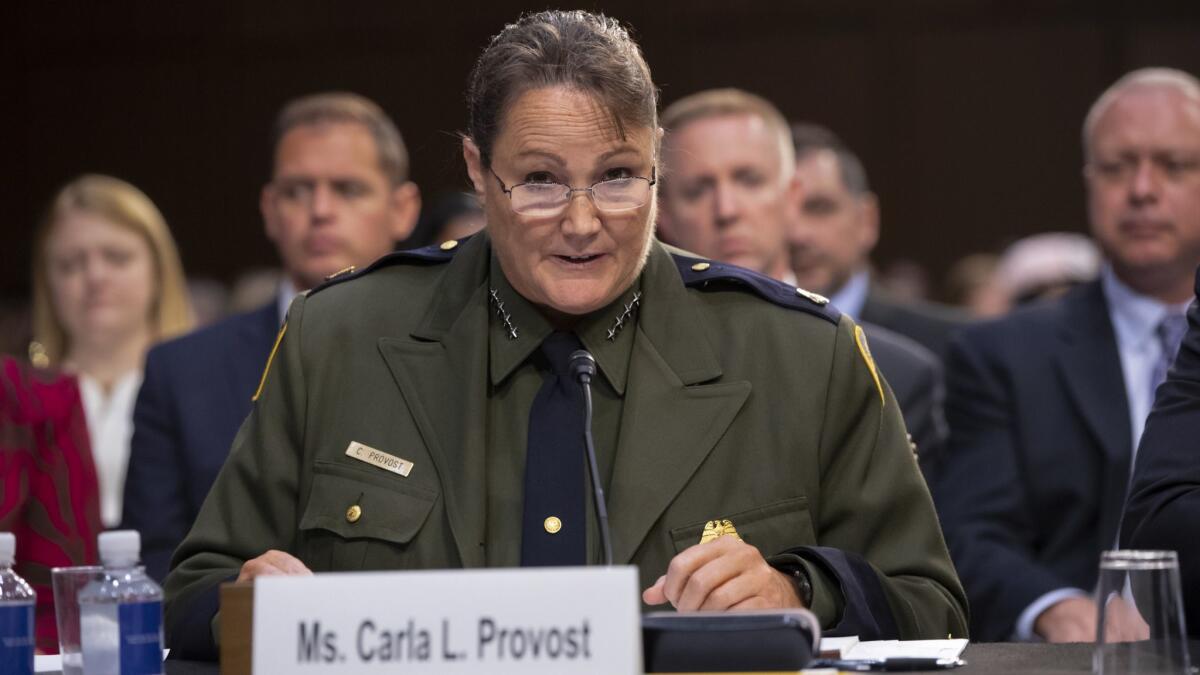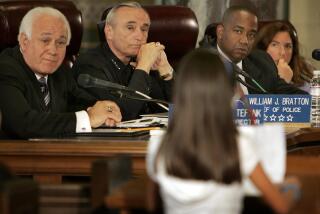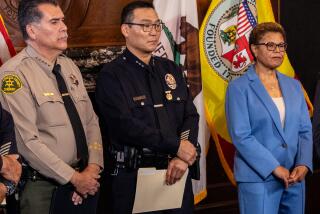Q&A: Border Patrol’s first female chief, Carla Provost, on border-crossers, a wall and women in law enforcement

Carla Provost, who served as acting chief of the Border Patrol for more than a year, on Thursday was named the first woman to lead the agency as chief in its 94-year history.
Provost, a former police officer in Kansas, joined the agency 23 years ago as an agent in Douglas, Ariz., rising through the ranks to become a supervisor in Yuma and El Paso. She also served as deputy assistant commissioner of Internal Affairs, which included overseeing compliance with Customs and Border Protection programs and policies involving corruption, misconduct or mismanagement. She became deputy chief of the Border Patrol in 2016 and is the agency’s 18th chief.
“There is no one more suited to lead the Border Patrol,” Customs and Border Protection Commissioner Kevin K. McAleenan said in making the announcement.
Provost, 48, answered questions from The Times about herself and the agency. The interview has been edited for length and clarity.
Why did you join Border Patrol?
My senior year of college, I had an internship with the Topeka Police Department. One of my parents’ friends was the head homicide detective there, so I got to see a lot more than most interns do. That led to me staying in Kansas after graduation and joining the Riley County Police Department.
I loved working with a local police department, but as a 20-something-year-old, I had always thought about what we perceived as the ‘sexy jobs’ — the FBI, DEA, U.S. Marshals. Fortunately, when I was an intern in Topeka, I had the opportunity to meet with one of the Marshals and really began considering a career outside local law enforcement.
I was going through the hiring process with the Marshals, and I was still working at the police department, loving my work but living paycheck to paycheck. Then, the Marshals announced a hiring freeze and wasn’t sure what was next. But a friend mentioned the Border Patrol was hiring.
I went to the [Border Patrol] Academy and then to Douglas, Ariz., in May of 1995, and after a year on the ground there, I swore I would never leave the Border Patrol. I ended up spending 11 1/2 years in Douglas. Maybe not a prime location, but the work is amazing.
Despite recruitment efforts at Border Patrol, women make up only 5% of about 20,000 agents, among the lowest percentages for federal law enforcement agencies. What challenges do you see in attracting more women to the job?
Our biggest challenge is that our environment is much different than any other federal law enforcement agency. The vast majority of our jobs are in smaller border towns, not in major metropolitan areas. The majority of our agents — 16,000 of them, at least — are along the Southwest border, living in small communities. While many of our areas have experienced significant growth and investment, such as south Texas, many are still very remote, such as Del Rio, Nogales, Yuma and Calexico.
In my experience, when it comes to the job and mission, there is no difference in the expectations between female agents and male agents — we’re all Border Patrol agents. We’re all expected to do the same job, man or woman. And the agents I’ve worked with over the years, what they care about is if you can do the job — will you be there for them when they need it? If you go out and do a good job, then you’re recognized for it.
I don’t necessarily want to be recognized because today I am the first female chief of the U.S. Border Patrol. I hope I’m recognized at the end of my tenure for the work that I did as a Border Patrol agent and ultimately, chief of the U.S. Border Patrol.
What’s toughest about Border Patrol work and why?
You’re working long hours, often by yourself, day and night. You’re out in the desert and you can come across armed smugglers at any given time, without backup, 20 minutes or more away from any assistance.
Personally, when I was just starting out as an agent, I found myself in a situation where I was with two other agents in the bottom of a ditch near Douglas, Ariz. And these smugglers were heaving large chunks of concrete at us. We eventually made it out of there, but if any of those chunks had hit us, we would have been killed.
It takes a special kind of person to do that, and to put themselves in that position. But if you are up to the challenge, the rewards are enormous. This job gave me a steady paycheck and a career to move forward in, but so much more. I was getting a chance to serve my country and protect the local community every day.
What is the greatest challenge facing the agency now on the southern border?
Ensuring the safety and success of the men and women in the field on the front lines. Every day, they put their lives on the line. Our agents are facing some of the most challenging environments under the most difficult of circumstances. I want to make sure that they have the very best training, the best equipment, the resources they need and the strongest possible support.
Operationally, the Southwest border of the United States is a highly diverse environment with equally diverse threats to the security and safety of our border communities and communities throughout the United States.
Without the resources, without more agents and without some changes in our abilities to enforce our laws, we will continue to see an increase in drug smuggling, an increase in gang members trying to infiltrate our communities by crossing into our nation illegally, and we will continue to experience increases in the flow of illegal immigrants coming to the United States.
The Trump administration’s “zero tolerance” policy and immigrant family separations have made headlines, and figures released this week show a greater share of those arriving at the southern border are families. What would you like people to know about how the Border Patrol responded this summer and how the agency plans to deal with immigrant families in the future?
Today, we have suspended referral for prosecution of parents who are traveling with their child or children as we work through a process to enforce the law and maintain family unity through the criminal prosecution of the adult.
I want to be clear that at no time was the policy of the Border Patrol or [the Department of Homeland Security] to separate families. The separation of families occurred only as a result of prosecution of a parent for illegally crossing the border. In my experience, I know that when there is a consequence for a crime committed, that the frequency of the crime decreases. Without consequences for breaking the law, people will just continue to break the law.
This is why we stress that consequences matter. We are a law enforcement agency, we enforce the law and when we are able to do that, we see decreases in those violating that law.
Is the proposed border wall a priority for you? What else is a priority?
We do need a wall. Through my experiences, we know walls work. Where we invested in a wall system — wall, technology, infrastructure and additional agents — we have experienced significant decreases in illegal border-crossers, and it impeded the flow of illicit drugs.
The president is committed to border security, and he has set a high bar for us to secure the border. What the men and women on the front lines tell me is, that in order to meet the president’s request, they must have more agents, more wall, more technology and more infrastructure to be successful in our mission.
In the previous question, you asked about the influx of families crossing the Southwest border. If we truly want to attain operational control and discourage families from taking the dangerous journey to attempt to cross into our country, then in addition to a wall system, we must close the loopholes in our current law that encourages families and children to make the dangerous journey.
molly.hennessy-fiske@latimes.com
UPDATES:
1:20 p.m.: This article was updated with additional information about the new Border Patrol chief.
This article was originally published at 12:20 p.m.
More to Read
Start your day right
Sign up for Essential California for news, features and recommendations from the L.A. Times and beyond in your inbox six days a week.
You may occasionally receive promotional content from the Los Angeles Times.







